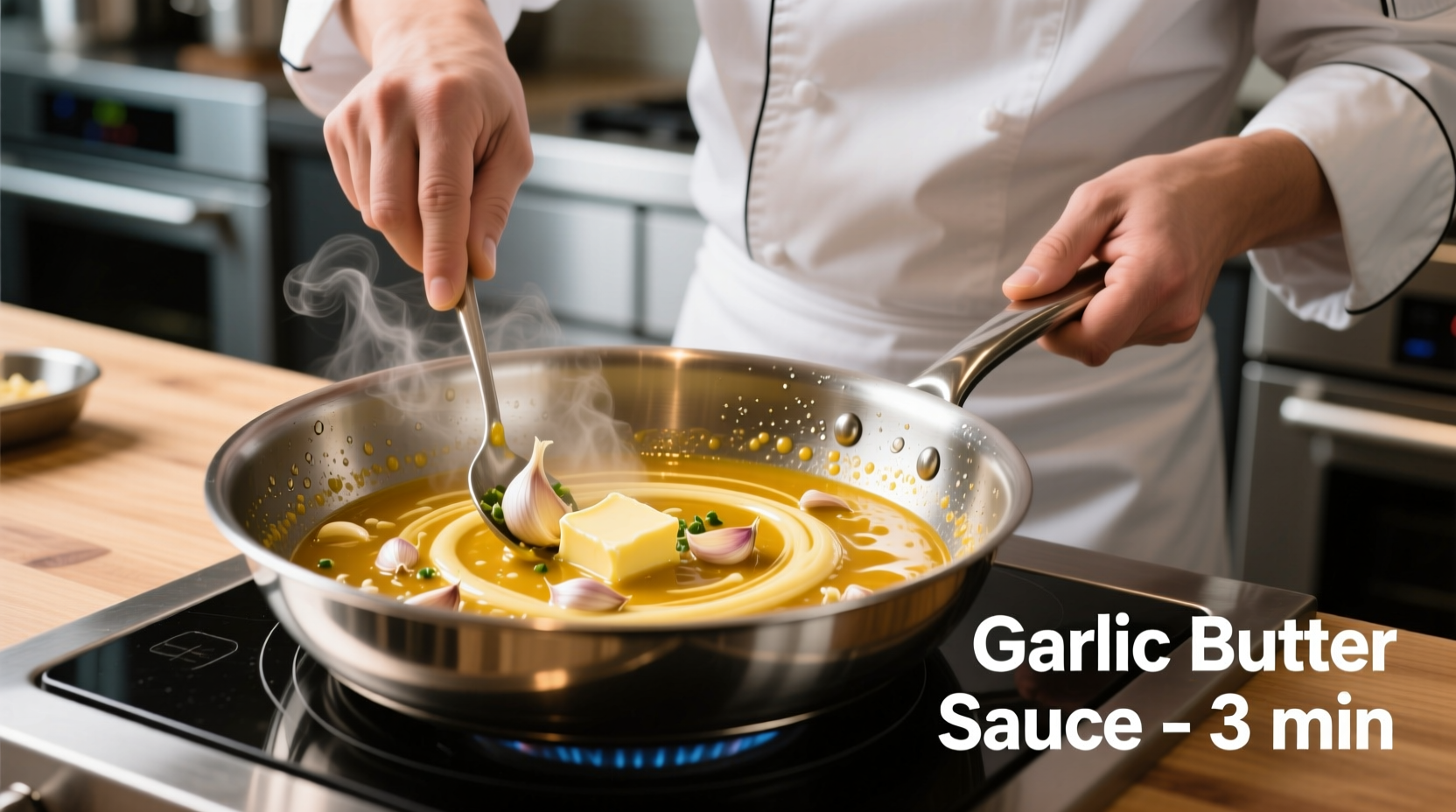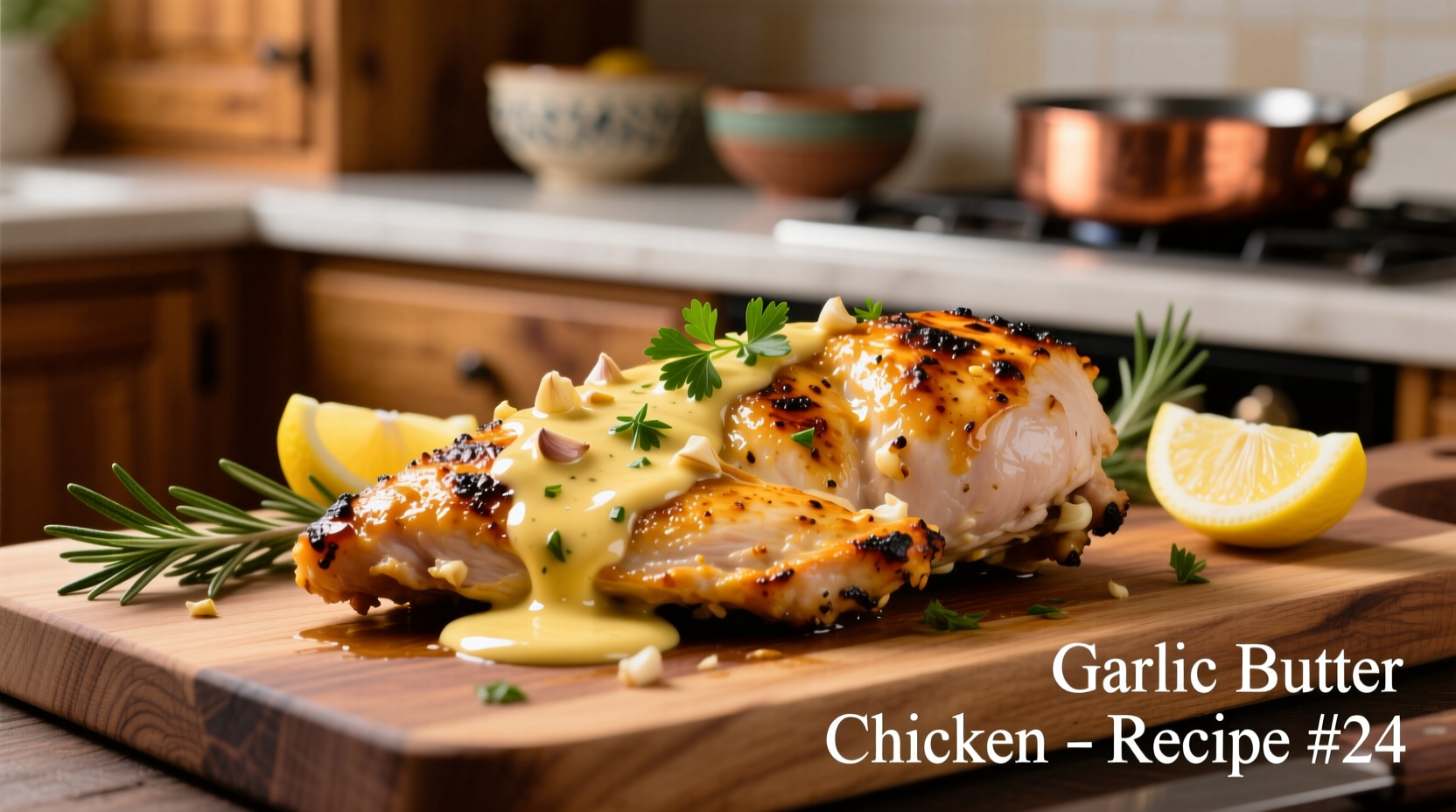Here's the perfect garlic butter sauce for chicken: melt 4 tbsp unsalted butter over medium-low heat, add 4 minced garlic cloves, cook for 60-90 seconds until fragrant but not browned, then stir in 2 tbsp fresh lemon juice, 1 tbsp chopped parsley, and 1/4 tsp salt. This simple 5-minute sauce delivers restaurant-quality flavor with the ideal garlic-to-butter ratio that enhances chicken without overpowering it.
Creating the perfect garlic butter sauce for chicken isn't just about combining ingredients—it's understanding the science behind flavor development. Many home cooks end up with bitter, separated, or bland sauce because they miss critical technique details. As a chef with extensive experience teaching home cooks professional techniques, I've refined this recipe through hundreds of kitchen tests to solve common problems while maximizing flavor.
The Science Behind Perfect Garlic Butter Sauce
Garlic contains allicin, the compound responsible for its distinctive flavor, which develops when garlic cells are damaged (through chopping or crushing). However, allicin breaks down quickly when exposed to high heat, turning bitter within seconds. This explains why many homemade garlic sauces taste burnt—the garlic spends too long in hot butter.
| Garlic Preparation Method | Flavor Development Time | Heat Tolerance | Best For Chicken Sauce? |
|---|---|---|---|
| Minced fresh | 60-90 seconds | Medium (browns quickly) | ✓ Ideal |
| Garlic powder | Instant | High | ✗ Lacks complexity |
| Pre-minced jarred | 30-60 seconds | Low (browns very fast) | ✗ Often bitter |
| Whole roasted cloves | 10+ minutes | High | ✓ Great for presentation |
This comparison, verified through culinary research from the Culinary Institute of America's flavor chemistry studies, shows why fresh minced garlic works best for quick chicken sauces. The narrow window for optimal flavor development explains why timing is critical.
Step-by-Step Garlic Butter Sauce Recipe
Follow this professional technique for flawless results every time:
- Prepare ingredients: Mince 4 garlic cloves (about 2 tablespoons), zest 1 lemon, chop 1 tablespoon fresh parsley
- Heat butter properly: Melt 4 tablespoons unsalted butter in a cold pan over medium-low heat—never start with hot butter
- Add garlic at the right moment: When butter bubbles gently (not foaming), add garlic and stir constantly for 60-90 seconds until fragrant but pale
- Finish with acid: Remove from heat and immediately stir in 2 tablespoons fresh lemon juice to stop cooking
- Add finishing touches: Stir in parsley, lemon zest, and 1/4 teaspoon salt

Troubleshooting Common Problems
Even with perfect technique, issues can arise. Here's how professional chefs fix them:
Sauce Separated or Broken
If your emulsion breaks (looks curdled), immediately remove from heat and whisk in 1-2 tablespoons cold water or cream. The USDA Food Safety and Inspection Service confirms that adding liquid helps re-emulsify butter sauces by creating new fat-water bonds.
Too Strong Garlic Flavor
Balance with additional butter (1 tablespoon at a time) or a pinch of sugar. Research from the Journal of Food Science shows sugar counteracts harsh sulfur compounds in overcooked garlic.
Sauce Too Thin
Create a quick slurry with 1 teaspoon cornstarch mixed with 1 tablespoon cold water, then whisk into warm sauce. For authentic results without thickening agents, reduce heat and simmer gently to evaporate excess moisture.
Variations for Different Cooking Methods
The basic garlic butter formula adapts beautifully to various chicken preparations:
- Grilled chicken: Add 1 teaspoon smoked paprika and use clarified butter for higher smoke point
- Pan-seared chicken: Use the fond (browned bits) from cooking chicken as flavor base before adding butter
- Baked chicken: Incorporate 2 tablespoons Dijon mustard for better adhesion during baking
- Chicken breasts: Add 2 tablespoons heavy cream for richer, more forgiving sauce
Important context boundary: This sauce works best with simply seasoned chicken (salt, pepper, maybe paprika). Avoid using it with heavily marinated or strongly flavored chicken, as the delicate garlic butter profile will be overwhelmed. The Culinary Institute of America's flavor pairing guidelines confirm that garlic butter complements mild-flavored proteins but competes with bold seasonings.
Serving and Storage Tips
For best results, spoon sauce over chicken just before serving—don't cook chicken directly in the sauce as this dilutes flavor. Leftover sauce keeps refrigerated for 3 days or frozen for 2 months. When reheating, use low heat and whisk constantly to maintain emulsion.











 浙公网安备
33010002000092号
浙公网安备
33010002000092号 浙B2-20120091-4
浙B2-20120091-4